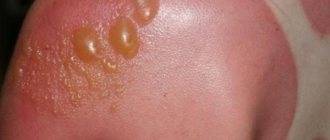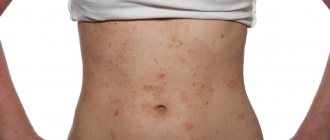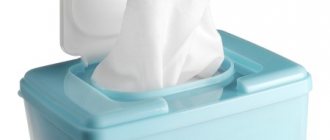The mechanism of occurrence of nervous itching
For a more understandable picture of the disease, all psychological problems - stress, anxiety, nervous overstrain, etc. – we will denote neurosis with a single term.
Is this a consequence of the influence of traumatic factors of the internal and external environment, under which the psyche becomes mobile? But there are no disturbances in the functioning of internal organs and systems of the body.
It is physical neurosis that leads to a number of pathologies in which a person experiences itching, burning, and tingling. Often, with neurosis, the epidermis becomes more sensitive, changing its usual shade to marble with bluish areas.
The more problems a person faces, the more the threshold of sensitivity increases - clothes, touches irritate, tactile hallucinations appear. Many patients complain that they feel like insects are crawling on them, etc.
Along with psychological traumatic factors, the main causes of itchy scalp are:
- traumatic brain injury;
- hormonal imbalance, including puberty and menopause;
- chronic diseases;
- physical exhaustion of the body;
- lack of sleep;
- disturbances in sleep and wakefulness, etc.
Treatment of psychosomatics is always carried out by a specialist - a neurologist, who determines the methodology and course taking into account the specific medical history.
If your head is constantly itching due to nerves, the following may be prescribed as general recommendations:
- Phenobarbital or Noxiron - to normalize sleep;
- Valerian is a sedative and sedative;
- Melitor - for depression accompanied by anxiety and sleep disorders, as well as for VSD of the hypertensive type with asthenic and anxiety symptoms;
- Vitamin D3 – supports the heart muscle, improves immunity, promotes restful and sound sleep, emotional stability, and reduction of sensitivity.
Be sure to prescribe psychotherapy during and after taking medications to stabilize the functioning of the nervous system and improve the overall emotional background.
Diagnosis of itchy scalp
It's no secret that for many who have an itchy head, nerves are the last thing on their mind. They begin with an examination for parasites, seborrhea, scabies, dermatitis and other diseases with similar symptoms. If the clinical picture is not confirmed, itching of the scalp can be classified as a manifestation of neurosis.
They begin their long journey of visiting doctors with a therapist, who gives referrals to specialized specialists. In turn, each of them is sent for analysis. Taking into account the specific situation, the neurologist continues the examination. He understands why the head itches, what contributes to it, and how to relieve not only the itching itself, but also the root cause.
Important! You should never diagnose yourself, even if you are sure that all the symptoms on the Internet are exactly the same as yours. Only a doctor diagnoses the disease and prescribes adequate treatment
The main factor indicating that itching of the scalp and other parts of the body appeared against the background of a person’s emotional state is:
- stress and anxiety occur almost simultaneously;
- the head began to itch immediately after a strong shock;
- There are tactile hallucinations - the patient has a feeling of crawling and biting insects.
As a rule, nervous itching is especially aggravated at night, when the patient is left alone with his condition.
Symptoms of scabies
A feeling of severe itching on the skin can occur for many reasons, for example, due to scabies or dermatitis. Only a doctor can make an accurate diagnosis. Symptoms of nervous itching include the following:
- rash on the body in the form of blisters or spots;
- tropical hyperemia;
- desire to itch a lot;
- swelling of tissues;
- severe weakness throughout the body;
- goose skin symptom;
- an individual rash that has not previously appeared;
- increase in body temperature (rare).
Symptoms of nervous itching of the skin can be very different and feel like hives or dermatitis. Only based on the results of a special analysis can an accurate diagnosis be made. Severe nervous shock the day before can give similar symptoms.
How to treat itchy scalp due to nervousness
First you need to understand that itching is not a disease, but a consequence of the patient’s nervous state. That is, it is not the scalp that needs to be treated, but the head itself and the nerves at the same time.
The peculiarity of psychosomatic diseases, including nervous itching, is accumulation. It is extremely rare for a person to become nervous and immediately have an itchy head. No, it takes a certain time when the quantity of negativity turns into quality, and then side effects appear, including an itchy scalp due to stress. Treatment must be comprehensive and long-lasting.
In general, the entire course of therapy follows 4 directions:
- Taking medications aimed at improving and stabilizing the emotional state. At the first stage, the doctor prescribes plant-based sedatives.
- Taking antidepressants and sedatives. Unlike tranquilizers, with which they are often confused, the action of antidepressants is aimed at increasing the amount of necessary mediators and normalizing the biochemical balance of the brain.
- Taking antihistamines designed to reduce the effect of sensitive skin.
- Psychotherapy sessions are an important aspect of helping a patient, which should not be abandoned in favor of a friendly neighbor, friend or family. If the people listed do not have the appropriate education and experience as a psychotherapist, they are unlikely to help you. The doctor's task is not to provide consoling sympathy, but to solve the problem that led to the failure. There can be many problems, and all of them must be resolved by a qualified specialist.
Non-pathological causes of itching on the back
- Skin irritation caused, for example, by dust. This is the simplest and most banal reason, and often the unpleasant sensations pass very quickly;
- Often, dry skin on the back begins to itch. The fact is that tap water is often not of high quality and can greatly dry out the skin. When it comes to the face, we, as a rule, do not forget to apply various moisturizing creams, but the back most often remains without such attention;
- Perhaps the chosen shower gel is not very suitable for you. Each person's skin reacts differently to hygiene products. Try changing your gel - maybe it’s the one that causes itchy skin;
- An allergic reaction rarely causes itching on the back. But if this is really the case, then anything can be an allergen. Specific foods, medications, or even clothing materials all come under suspicion;
- If your back itches during warm seasons, insect activity may be the cause. In the summer, mosquitoes bite indiscriminately, so if you find a characteristic bite spot on an itchy area, don’t worry - everything will go away soon. It’s a different matter when it comes to bed bugs, which do not disdain human blood even in winter;
- Often such problems begin in older people. The skin begins to undergo age-related changes, which can result in the formation of nodules or warts.
Prevention of nervous itching
Of course, we can give universal advice - don’t be nervous, don’t worry, everything will pass and this too, etc., but in reality, few people are able to abstract themselves from nervous shocks.
Your task is to stabilize the functioning of the nervous system and make yourself more stress-resistant. And for this there are very useful tips:
- A nutritious diet - even a lack of vitamins, such as vitamin D3, can already become a catalyst for problems. In spring and autumn, take a vitamin complex and try to eat well.
- Healthy sleep. Choose the mode in which you wake up rested. 6-8-10 hours - each of us has our own rest period that must be observed. If you can’t sleep, consult your doctor for a relatively mild sedative.
- At least once every 2 years, check the functioning of the thyroid gland and the level of hormones in the body.
- Take care of yourself literally - developmental activities, sports, cultural events. Get out of the vicious circle of “home-work”, look for something that gives you pleasure and do it even when it seems like you have no time at all.
Causes of itching
If unpleasant itching occurs on the scalp, this may be due to the fact that the skin is very dry. It is often accompanied by hair loss. If it bothers you on your arms and legs, it may be due to tight clothing, or when there are residues of washing powder on it.
Among the many reasons, there are ten most common ones. In any case, it is impossible to independently determine why the itching does not stop for a long time, since even an experienced doctor is not immediately able to determine the source of the trouble. The reasons can be completely harmless factors and those that lead to serious problems, such as:
- disturbances in liver function;
- food intolerance;
- reaction to taking certain medications;
- temperature fluctuations;
- dry skin in old age;
- mental disorders;
- diseases associated with the endocrine system;
- tumors;
- anemia;
- parasites.
Skin diseases are distinguished separately: scabies, urticaria, allergic dermatitis, herpes zoster, eczema, etc.
Rash and itching on the back as symptoms of the disease
- The most common non-infectious skin disease is psoriasis. If you have a red, dry spot of an uneven shape, which is slightly raised above the general level of the skin, then you can suspect this particular disease. Psoriatic plaques are not always obvious, but itching may well signal the presence of this disease. But even if a small red spot appears on your back that itches, you should definitely show it to a dermatologist.
- The next number is scabies, which is known as one of the most unpleasant and difficult diseases to treat. The name itself says that the feeling of itching in the body will not leave the patient. It is caused by a microscopic parasite - the scabies mite. Even two thousand years ago, scabies tormented our ancestors, but thanks to modern diagnostic technologies we can easily recognize it.
The danger of scabies is also its contagiousness, so at the first suspicion it is worth protecting the patient from contact with others until the diagnosis is confirmed or refuted. The disease often strikes in winter, when ticks are especially active.
- A rare, but no less unpleasant cause of itching can be atopic dermatitis, a disease that affects people with a tendency to atopy. As a rule, dermatitis causes hypersensitivity and profuse rashes.
The disease rarely makes itself felt in the summer, so be especially careful during cold seasons.
- An itchy back may be an external manifestation of an internal disease. These may be pathologies of the gallbladder, liver, and endocrine system. In addition, diabetes mellitus often manifests itself in this way. One way or another, any rash on the back of an adult or child, even if it does not itch, is a reason to visit a doctor.
- However, an adult’s back may itch due to simple anxiety or neurosis. And the area between the shoulder blades often itches due to lack of hygienic care, excessive exposure to ultraviolet radiation and a number of other external reasons.
Nervous skin itching
The expression “all diseases come from nerves” is known to everyone, and itchy skin is one of the symptoms of nervous tension. Problems that often have to be solved one after another undermine the internal strength of the body, and it cannot cope with the load. In most cases, itchy skin goes away on its own and no treatment is required. But sometimes severe cases arise in which a visit to the doctor cannot be avoided. You should not ignore the symptom, as the disease can become chronic.
At risk are women with an unbalanced character and children who are too emotional.
What is the reason for the appearance of nervous skin itching? It all depends on what a person’s reaction is to a particular problem, how he copes with complex life problems. If a person panics, has nervous breakdowns, and often experiences depression, the chances of developing rashes and itchy skin increase many times over. There is no single picture of the manifestation of this symptom, and itching can appear both during a stressful situation and after a certain period. It all depends on the character of the person, his individual characteristics and his resistance to stress. In some cases, the patient is able to scratch the skin to the point of wounds, and if help is not provided, infection may begin.
Causes
Mental disorders, neurological weakness and psychosomatic diseases are the causes that cause nervous itching. It can also occur in completely healthy individuals as a result of shock, stress or depression. Experts say that nervous itching is an allergy that manifests itself during stress. Changes in acetylcholine, which plays an important role in transmitting tension to the nervous system, are the main cause of skin rashes.
Among the factors that can cause itchy skin due to nervousness are the following:
- recent shock;
- feelings of intense fear;
- the presence of various phobias;
- stress for a long time;
- severe depression.
Itchy skin and its treatment
The main task is to eliminate the cause of the itching, and this will require taking sedatives. If the attacks of anxiety are short-lived, then valerian will help. For regularly occurring mental problems, when nervous breakdowns become habitual, the doctor should, after a thorough examination, prescribe more serious medications. They should be selected with caution, as addiction quickly occurs.
Treatment must be comprehensive, since it is impossible to achieve results with temporary measures. The patient is prescribed antihistamines, the purpose of which is to relieve itching as the main symptom.
Since this symptom can be applied to many diseases, self-medication is strictly unacceptable. Sometimes they struggle with rashes for a month, but the problem is not solved. Only a professional doctor can find out the cause of the disease and prescribe effective treatment. You will probably need to consult an allergist, neurologist, and in some cases a psychologist will help.
There are a number of mistakes that people make when self-medicating:
- Without establishing the exact cause of itching and rashes, it will not be possible to get rid of it. It will turn out that the situation will become more complicated and, as a result, even greater nervous overload will intensify the already sad picture of the disease.
- You cannot lubricate areas of itching and rashes with ointment containing hormones without a doctor’s prescription. In some cases, their use is contraindicated.
- If you use medications for a long time without a doctor’s prescription, this often leads to irreversible changes in the body.
- If you refuse to take sedatives, itching, as an additional irritant, seriously affects the nervous system and weakens it even more.
First of all, you need to see a doctor. He will order an examination, you will need to take blood, urine, and stool tests.
The main thing is peace of mind and calm. It is important to learn to control yourself, avoid stressful situations, and receive positive emotions. Do not hesitate to contact a psychologist, try to be open-minded about the prescribed medications if the case is severe. When it is not possible to work in a quiet environment, change your place of work and communicate more with your family. It will be good to feel their support and understanding, reconsider life values, and lead a healthy lifestyle. If physical activity is currently too much, it also needs to be reduced for a while.
Only all factors taken together can improve the situation, so we can’t recover just by taking pills—our health is in our hands.
The main symptoms of skin itching due to nervousness. Why can the whole body itch from nerves? What to do and how to get rid of itching after nerves.
In some cases, exposure to stress serves as a catalyst for the development of many diseases. When skin diseases occur against the background of neuropsychic stress, the symptoms are limited to skin itching, hyperemia and various rashes. Diagnosis of diseases that cause nervous itching of the skin, determination of symptoms and therapeutic effects should be carried out by a specialist; self-medication in this case is not advisable.
Basic treatment conditions
If symptoms of nervous itching are confirmed, it is not advisable to self-medicate and you should definitely consult a doctor. He will determine the severity of nervous itching, take all the necessary tests and prescribe treatment for nervous itching.
To get rid of nervous itching and remove not only the symptoms, but also the cause itself, you need to take special medications. You can't do without them. Their action will be aimed at normalizing human systems during nervous itching. Medication-based sedative tablets are suitable for treatment.
In severe mental disorders, itching can appear on the head, face and even in the throat. Therefore, after detecting symptoms, you should definitely seek help from a psychotherapist.
You can independently remove the symptoms of scabies due to nervousness using ointments. They should include glucocorticoids. When treating nervous scabies, you cannot do without allergic medications.
To remove scabies completely, you need to undergo a course of comprehensive treatment. Usually the doctor himself prescribes, in addition to ointments and other medications, antihistamines. With their help, you can quickly relieve swelling, redness and itching on the skin.
Your doctor may prescribe a special ointment for itching.
How to get rid of itching at home?
If scabies appears suddenly, and there are no special medications at home to relieve it, you can use home recipes. They will not completely remove skin itching, but they will relieve discomfort.
To begin with, a woman or man can try taking a cool shower and applying hygiene products. Another remedy is a solution of water and vinegar. They need to wipe the red areas with a washcloth. Do this very carefully so as not to scratch the skin.
To prevent such situations from disturbing a person, you need to try to protect yourself from possible stress and stress-related disorders. You can consult a psychologist who can help you solve various problems. The use of sedatives will improve a person’s general condition and prevent the onset of depression due to nervousness. You can also prepare an herbal tincture. Soothing herbs such as propolis, chamomile or St. John's wort are used for it.
Sports and yoga help a lot. A person should rest more, sleep well and walk in the fresh air. If you follow these recommendations, you can prevent stress and depression, and scabies from nerves will never bother you.
Pharmacological therapy
It is recommended to coordinate all measures to overcome itching that occurs due to nervousness with a medical professional. A dermatologist will help determine the causes of the occurrence, if necessary, involve additional specialists, correctly assess the severity of the situation, and prescribe appropriate pharmacological drugs and physiotherapeutic procedures. For moderate to mild conditions, the following treatment is usually recommended:
- decoctions of soothing herbs;
- aromatherapy with natural essential oils of lavender, mint, lemon balm;
- sedatives;
- warm baths with lavender, sage, chamomile or oak bark;
- meditative practices and breathing exercises.
The mainstays of therapy are sedatives. At the initial stage of treatment, herbal remedies with mint, motherwort, peony, valerian, lemon balm and hops are prescribed, and if the latter are ineffective, stronger chemicals are used.
If the patient is in a serious mental condition, then a psychiatrist should treat him. You can call a psychiatrist to your home. In this case, the patient is prescribed potent tranquilizers (Sibazon, Phenazepam, Mezapam) and antidepressants. Almost always, long-term use of these drugs causes drug dependence, so they are usually prescribed in short courses (no more than 30 days).
When used occasionally in small doses during an anxiety attack, no side effects are detected. The dosage is selected individually so that the patient’s performance does not suffer. Tranquilizers, unlike antidepressants, are usually well tolerated.
In the complex treatment of nervous itching, it is important to use antihistamines (Suprastin, Fenkarol, Claritin). Medicines in this group relieve inflammation, eliminate swelling and itching. These drugs should be used with caution in young children and pregnant women.
In order to quickly relieve the symptoms of skin itching due to nervousness, ointments with hydrocortisone (Lokoid, Fluorocort, Sinaflan) are used, as well as creams with an antiallergic effect (Gistan, Fenistil).
To improve immunity, it is recommended to take a mineral-vitamin complex with magnesium and B vitamins. In addition, you should establish a work and rest schedule, follow a diet rich in protein, complex carbohydrates and dietary fiber.
Nervous skin itching is a signal that the body's reserves have been exhausted and it is in a difficult situation. In this case, a professional's view and a thorough examination are necessary. Following the recommendations will make it possible to quickly overcome the problem and prevent a relapse.
Folk remedies
If it’s a long way to go to the hospital, and nervous itching is hard to tolerate, you can use home remedies. It has been noted that the skin stops itching after wiping with a sponge moistened with cool water. You can dissolve a little vinegar or sea salt in it. A hot soda bath (200 grams per 50 liters) will help with nervous itching. Even after one procedure, the body stops itching. A cool shower without using detergents can also be helpful.
Medicinal herbs can be used internally and externally in the form of rubdowns and baths. Oats, chamomile, fenugreek, oak bark, and lavender have a calming effect. You can wipe the itchy area of the body with a strong decoction of this herb (0.030–0.200) or add it to the bath. You can also relieve itching with tomato juice diluted with water or any menthol cream.
It is good to take a decoction of medicinal plants internally with a sedative effect. Nervous itching responds well to treatment with mixtures based on immortelle, mint and tansy (0.020–0.200).
If your body or head itches, you can take a bath or wash your hair with nettle decoction (200 grams per 8 liters). Pour the broth into the bath and soak for 20 minutes. For minor affected areas, you can locally wipe the skin with fresh nettle juice. The product is highly effective.
Itchy areas of the skin can be treated with a decoction of marjoram, flaxseeds, elderberry flowers, juniper or oak bark. Treatment should be carried out daily in the morning and evening until the irritation completely disappears.
Preventing itching
Preventive measures for nervous itching include avoiding stressful situations. It is recommended to undergo several psychotherapeutic sessions; this will help you look at the situation from the inside and find the underlying causes of your psychological state.
Regular consumption of herbal decoctions helps reduce nervous tension.
If there is an exciting event coming up the day before that will make you nervous, you should take a sedative in advance, for example, valerian drops. This will help relieve tension and avoid nervous itching. It is very useful for people with this problem to practice yoga and meditate.
It should be remembered that itching does not always occur from nerves; there are many diseases that can cause a skin reaction. In this case, it is important not to miss the initial stages of the pathology, but to promptly seek help from a dermatologist who will conduct an examination, determine the causes and prescribe complex therapy based on the causes.
Preventive actions
If a person notices that he develops scabies due to stress, he should know how to prevent it. When certain parts of the body itch, doctors recommend using the tips below:
- conduct sedative therapy sessions several times a month;
- drink herbal sedatives or brew them instead of tea;
- light fragrant candles at home for calm;
- do yoga and meditation;
- eat right and exercise;
- stop worrying about trifles and not taking problems seriously.
Such techniques will help strengthen the central nervous system and prevent the formation of scabies due to stress. The person will be more stress-resistant and will be able to control himself in many unpleasant situations.
After gaining inner peace, scabies due to nervousness will not appear.










